Album: “22, A Million”
Release Date: Sept. 30
Label: Jagjaguwar
Grade: A
Indie-folk band Bon Iver was founded in 2007 by singer-songwriter Justin Vernon. The group independently released their first album, “For Emma, Forever Ago,” in 2007, followed by their self-titled album “Bon Iver” four years later.Following their last show of the 2012 tour, the band announced they would take a break from performing. After a five-year hiatus, Bon Iver returns to the music scene in 2016 with the release of their third album, “22, A Million."
The opening track on the album, “22 (OVER S∞∞N),” begins with a soft descending chord progression on an electric keyboard. Vernon’s familiar airy vocals resemble that of his previous work, but the electro-centric melody set the tone for the remainder of the album.
The absence of a traditional chorus is substituted by the phrase “It might be over soon,” which is repeated in each verse. In the final line of the track, Vernon sings, “Within a rise there lies a scission.” This is a possible reference to the negative effects associated with fame, as a sharp increase in success can lead to a scission, or divide between individuals or groups. Alternatively, this phrase could be an acknowledgment of the fragility of human existence.
The subsequent tracks “10 d E A T h b R E a s T ⚄ ⚄” and “715 - CR∑∑KS” make it clear that the band has undergone a complete transformation. Excessively auto-tuned vocals and emphasized bass lines create a sound that is foreign to their previous indie-folk sound.
The tone of the album shifts with the fifth track, “29# Strafford APTS.” In this track, a warm guitar melody accompanies soft vocals. This song strays from the intense synthesizer sounds of the previous tracks. The narrative lyrics and folk influences are reminiscent of Bon Iver’s first album, “For Emma, Forever Ago.”
In “21 M◊◊N WATER” the experimental nature of the album is evident. The song opens with 57 seconds of instrumentals, followed by ambient tones sporadically punctuated with bursts of distorted audio fragments.
The final track on the album, “00000 Million,” effectively combines the band’s traditional sound with the new electronic sound. The song elaborates on Vernon’s path of self-discovery, a recurring theme of the album.
Overall, the album is incredibly well-executed. Songs flow effortlessly into each other but do not bleed together. At first observation lyrics appear to be disjointed, but when analyzed, they prove to have complex undertones. Verses have a poetic quality and can be interpreted in different ways.
Additionally, Bon Iver experiments with unorthodox song titles on this album. Normally associated with measurement and record-keeping, Vernon contradicts this notion by using numerals and symbols irregularly in song titles as a method of creativity.
“22, A Million” is a perfect example of an experimental album that challenges traditional music norms and embraces the unknown. It requires attention to small lyrical details and instrumental elements. Producing an album with a sound totally uncharacteristic of a band’s previous work is a huge risk, but it is one that is ultimately beneficial for Bon Iver.

